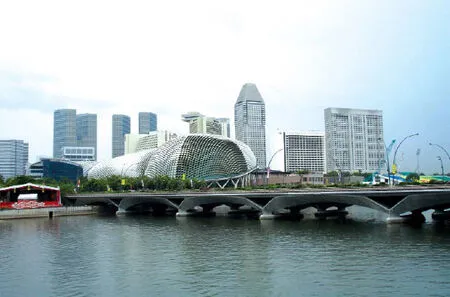Singapore is Conducive to the Further Development of International Financial and Entrepot Trade in Chongqing
2016-10-24
Singapore is Conducive to the Further Development of International Financial and Entrepot Trade in Chongqing

Interviewer: Zeng Rui
Interviewee: Hu Dinghe, the deputy president of the Association of Industry and Commerce in Chongqing, the president of Lifan Holdings Ltd., and the president of Lanyang Financial Holdings
Hu Dinghe, a well-known entrepreneur in Chongqing, told in an interview that, Chongqing will learn and benef t a lot from Singapore through their cooperation in various f elds from city management to international trade and international f nance.
Singapore is a pearl of economy, democracy and legal system not only in Asia but also in the world, and I myself have been to Singapore for many times. Some people believe that the success of Singapore has proven that diligence, intelligence, and good government and policies are key factors to create an economic miracle beyond that of western industrialized countries. Let us f rst simply f gure out those economic miracles for which Singapore is well known in the world.
For the inland Chongqing people, they know very little about Singapore's economic miracles and in their impression Singapore just is a garden city of strict legal system. They even have no knowledge that Singapore has been evaluated for many times as a country with least corruption and most innovation in the world and one of the best countries to do business with.

Singapore is the world's fourth largest shipping center, the largest distribution center for ocean transit shipping, the world's fourth largest financial services center, and the second largest gaming center. It is also one of the world's largest aviation centers and undertakes the transfer business from Australia to Europe. At the same time, as many as 11 million people travel to Singapore every year. In recent years, it has become the main service center of health care and education in Asia. Every year, Singapore takes in nearly 90,000 overseas students mainly from China, India and ASEAN countries, and has 200,000 patients from all over the world accept advanced medical services there. Singapore’seconomy mainly relies on manufacturing and service industries. Over 2 million of its 3.18 million labor force have their jobs in the service industry, and the manufacturing industry accounts for 27% of its GDP, including electronics, oil refining, pharmaceuticals, ship maintenance and shipbuilding, and so on.
City management is worth learning by Chongqing
The first thing Chongqing can learn from Singapore is its city management. Singapore is a model smart city and cooperation with it is conducive to the construction of Chongqing as a smart city, sponge city and transit metropolis. Meanwhile, cooperation is of great significance for the longterm development in Chongqing. For example, the convenience rate of Chongqing rail transportation ranks first in the country, which is hard to get, but people still often complain about the traf fic in Chongqing. However, also with less land area, less local resources, and high population density, Singapore's transportation system is well developed. The road traff c is unimpeded, the underground traff c is in good order, and the whole country breathes with fresh air. Very few people in Chongqing know what measures Singapore government has taken to control the traff c:
The f rst thing is to restrict people’s desire for private cars. Singapore is one of the richest countries in the world. One out of six families has more than $1 million in liquid assets and Singapore has the highest concentration of families with millions of dollars in the world. However, the car ownership rate in such a rich country is only 10%, the lowest among the developed countries. Such low car ownership rate is the main reason for clear road traf f c, which is also the result of government regulation on cars demand.

The second is to vigorously develop public transportation network, and to provide ef f cient taxi service with reasonable price. Recently I have read an evaluation of the existing cooperation projects between China and Singapore, which was made by a famous scholar in Singapore, and in my view, it's very wonderful and gets to the point. The scholar is named Koh Chin Yee and he holds that for Singapore, these projects provide it with an excellent opportunity to have a deeper understanding of the operation between China's central government and local governments. At the same time, it can transfer its such ef fective software as investment attraction, pro-business, economic planning, urban planning and management to China. For China,Suzhou industrial park provides a set of ideas of industrialization and urbanization, and after adjusting to China’s national conditions, such ideas can be institutionalized and applied to areas beyond Suzhou. Now, we can see that many industrial parks and cities in China have been influenced by Suzhou industrial park. Like Suzhou industrial park, if Tianjin eco-city is carried out successfully, the experience can be applied to the surrounding cities in northern China, and can provide an urban and economic development mode for the coordinated development of Beijing-Tianjin-Hebei area.

With the continuous development of China's reform and opening up, especially with the wider opening to the outside world of inland cities such as Chongqing, the third intergovernmental cooperation project between China and Singaporefalls to the ground in Chongqing. In addition to the bilateral direct project docking and implement, we must also actively absorb Singapore’s advanced experience in city management and public management, and combine with the actual situation of the mountainous city Chongqing to benef t its citizens.
Expected to strongly pull Chongqing’s international f nance and entrepot trade
It is stressed in the seventh plenary session of the fourth Chongqing municipal CPC party committee in November 2015 that the framework agreement of “Sino-Singapore (Chongqing) strategic connectivity demonstration project” is of great significance, and “the project should be developed as a new demonstration project for Sino-Singapore bilateral mutually beneficial cooperation”. In my opinion, this is undoubtedly a scientific judgment on Chongqing’s future development made by Chongqing municipal party committee and government, who arrive at the conclusion based on the existing economic basis and the prospects for development, combined with the new third intergovernmental cooperation projects.
As the city leaders have pointed out:“Looking from the related indicators in finance, Chongqing is likely to play a greater role in the whole country on the basis of the construction of a f nancial center in the upper reaches of Yangtze river, and it will be turned into an important functional financial center in China.” By 2020, offshore financial settlement, cross-border RMB settlement, equity and commodity factor market transactions and the centralized transactions of insurance products are expected to take a leading role nationwide, and the gathering and radiation ability of financial elements are to be further enhanced while a financial system with complete license, numerous institutions and comprehensive services is to be established. The f nancial resources and development experience of Singapore, the world's fourth foreign exchange trading center and one of the world famous financial centers, will undoubtedly have an important impact on Chongqing to achieve the above objectives.
International finance generates from international trade, and international trade comes into being before international finance. The cooperation between Chongqing and Singapore will first has a great influence on Chongqing’s entrepot trade. For instance, Singapore used to import a lot of goods from Europe and America by direct air freight and shipping while shipping is time-consuming and air transport is of high cost, but now such goods can be transported to Chongqing first by the strength of Eurasia International Railway, and then transferred to Singapore by air freight or the to-be-finished span-Asia railway, which saves about one month than the current shipping and costs much less than air freight. In a matter of fact, Chongqing and Singapore already have speci f c cooperation project in aviation f eld. Chongqing’s new airport T3 after completion will be in the charge of Singapore and Singapore takes up 51% of T3’s commercial operation shares, which will push forward the internationalization process of Chongqing’s airport. Furthermore, Chongqing’s airport connected by Eurasia International Railway will help increase entrepot trade, especially those between Chongqing and Singapore because Chongqing’s airport is under Singapore’s management. As entrepot trade increases, naturally, the international finance will be developed. Though Singapore just is a city country, it is one of the world financial centers, so it will play an active role in the further internationalization of the inland city Chongqing, in the development of Chongqing’s international f nancial industry development, and in promoting exchanges of talents and information.
At the same time, Singapore’s economy is obviously with the characteristics of state-owned economy, which can provide some reference ideas for our reform of state-owned enterprises and some experience to solve such problems of state-owned enterprises as “low ef ficiency” and“high marketization”.
杂志排行
重庆与世界的其它文章
- Economic and Trade Cooperation Makes Chongqing and Bahia Closer
- Historical Events of the 3rdChina-Singapore Intergovernmental Cooperative Program
- 友好关系新定位 合作发展新开拓
- 半部三国在三峡奉节白帝城:三国中最悲戚之地
- Half of the Three Kingdoms History is Embedded in the Three Gorges Baidi Town in Fengjie : the most rueful place in the Three Kingdoms
- Taiping Gate: being found after years’ burying
